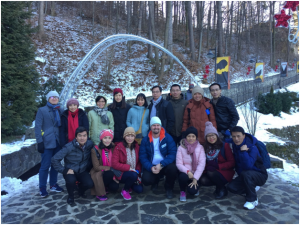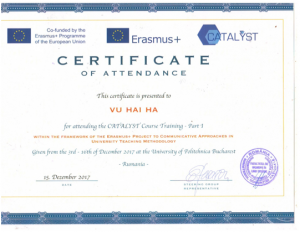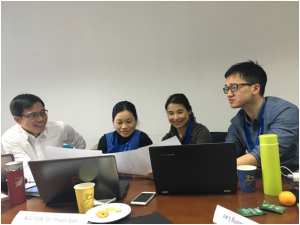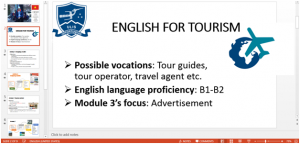CATALYST PROJECT: The trip to Romania
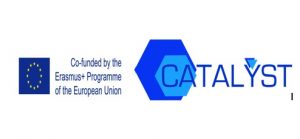
BACKGROUND
The three-year project entitled“Communicative Approaches in University Vocational Teaching Methodology focusing on Improving Educational Yield and Sustainability” (CATALYST)is co-funded by the ERASMUS+ Programme of the European Union. This is the first EU’s project in which University of Languages and International Studies, Vietnam National University, Hanoi(ULIS, VNU) participates with the hope of enhancing its capacity in higher education.
The primary aim of this project is to develop and implement a coherent program for vocational teaching in Vietnamese and Laotian universities frameworked with ECTS/TUNING in response to their specific needs and situations. The project comprises 05 work packages with 11 modules, working towards the ultimate goal of improving quality of university vocational education.
The project also highlights the cooperation between EU and PC universities in curricula design and vocational teaching methodology. Taking part in this program will benefit participant universities greatly in developing new learning and teaching tools, enhancing teaching methodologies and curriculum quality in the area of English for Specific Purposes. The project also offers opportunities for their teachers to attend training courses in EU countries, thus bringing the capacity of their staff to a higher level of development.
This brief report is to outline the main activities carried out by ULIS, VNU as a project partner and beneficiary over the 4-month period from this kick-off meeting in November, 2017 to February, 2017. This report also follows the first one, which covers the period of March, 2017 to October, 2017.
REPORT
The activities carried out by ULIS, VNU related to this project could be broadly categorized into three main groups: the training in Bucharest, Rumania, the follow-up activities, and preparation for the training activities to be held in Dresden, Germany (March, 2018)
- Training activities in Bucharest, Rumania
The first trainingperiod took place in Bucharest, Rumania3/12/2017 to 16/12/2017 and was very well attended by different partners in the project. The three representatives from ULIS, VNU attending the trainingwere Dr. Vu Hai Ha (Dean, Faculty of English language teacher education), Ms. Nguyen ThiThanh Van and Ms. Nguyen Thuy Phuong Lan (Lecturers at the division of English for specific purposes, Faculty of English language teacher education).
The main outcomes from these training sessions include:
- Training activities: Six modules (out of 11 in total) were covered during the first training sessions, namely:
- Module 1: Communicative approaches in vocational education
- Module 2: ICT/Blended/E-learning
- Module 3: Innovation methodology in vocational teaching and learning with focus on Internet &library
- Module 7: Teaching for diversity
- Module 9: Introduction to QA aspects on ECTS and module descriptors
- Module 10: ESP Pathway program module
Each module involved a wide range of teaching and learning activities, including lecturing, discussion, group presentation, projects etc. The learning outcomes were demonstrated through a final group presentation.
- Project management: Throughout the training sessions, various opportunities were taken to facilitate project management. The main activities include:
- Financial management: General financing principles, specifications on different types of costs, guidelines for reports, checks and audits etc. were among the main topics covered by the project coordinator to help clarify queries about financial management.
- Review of project objectives: The roles of the PC/universities, the project activities and methodology, and the expected impacts of the project were revisited during the training to make sure that every PC/university could keep track of the project progress.
- Plan for future activities: Plenty of discussions also took place regarding the visa application procedures for the upcoming destination for training, the future pilots and visits. As for ULIS, it has been agreed that the following three pilots would take place in August-September, 2018; November-December, 2018; and March-April, 2019.
- Culture activities: A certain amount of time was also devoted to raising cross-cultural awareness between participating countries.The activities included visiting famous tourist attractions in Bucharest, enjoying local cuisine, experiencing and learning about Rumanian history and culture etc.
- Follow-up activities at ULIS, VNU
On returning from the training in Bucharest, ULIS participants were fully aware of their responsibilities for publicizing the project and reporting to the institutions and project manager regarding their training activities. The main outcomes and meetings to achieve these goals included:
- Reporting to the president about the project: The training together with its outcomeswere reported to ULIS president in January, 2018. ULIS president expressed his appreciation of the project as well asfull support of the project implementation at the university in the future. He also expressed his expectations that at least 03 teachers or teacher trainers could be trained from this project to maximize its outcomes to serve educational programs and curriculums at ULIS, VNU.
- Reporting to the project manager:As the project manager, Ms. PhungThi Kim Dung, did not participate in the training, a meeting in December, 2017 was held to report back to her the main activities and outcomes of the training period, including the project management activities, training schedule, and the plan ahead. After the meeting, a number of adjustments and outcomes have been achieved so far, namely the specifications of the plan for 2018-2019, the financial bookkeeping and management, financial reimbursements, task delegation and duty specification, and so on. This report itself is one of multiple outcomes of this meeting with the project manager.
- Preparation for the training activities in Dresden (March, 2018)
As the next stage in the project involves a 15-day training course taking place in Dresden, Germany (March, 2018), active preparation at ULIS has also been underway. This includes:
- Project staff appointmentand allocation of duties. Since the kick off meetings, theULIS members of the project and their responsibilities have been identified. After the training in Bucharest, these roles and duties were confirmed, namely:
- PhungThi Kim Dung, coordinator
- Vu Hai Ha, academic trainer
- Nguyen Thuy Phuong Lan, academic trainer
- Nguyen ThiThanh Van, academic trainer
- Nguyen Kim Phuong, project secretary
- KhoaAnh Viet, project technician
- Visa application: All of the three trainers have successfully completed and applied for the Schengen Visa, which allows them to participating in the training in Dresden, Germany.
- Identifying the main activities before and after the training in Dresden, Germany. The training in Bucharest shed plenty of new light on the duties ULIS, VNU is expected to take on in the final stage of the project. Most importantly, it has been agreed that the course on English for Tourism currently under developmentat ULIS, VNU fits the project best in terms of its objectives and methodology. Certain decisions and actions have been taken to pave the way for the pilots of this program in the coming years so that it will integrate training outcomes, modules and methodology acquired by the trainers in the training in Bucharest and Dresden. Plans have also been outlined for the trainers to conduct their Home Multiplier Factor training before and/or after the training in Dresden (March, 2018).
CONCLUSION & RECOMMENDATIONS
Within the past four months, ULIS participants have been working actively for the follow-ups on the meetings and the preparation for the next stages. So far, all the participants have shown their strong commitments in taking part in the project as well as maximizing the efficiency of their contributions towards the common goals. Compared with the first stage, we strongly appreciateimprovements in terms of the timely responses from the managers and coordinators in the past few months. However, we would suggest that the future training should be less packed in terms of workload, more flexible by giving more time for self-study so as to be more enjoyable and effective.
Appendix. Some pictures of the ULIS participants at the training in Bucharest, Rumania.
